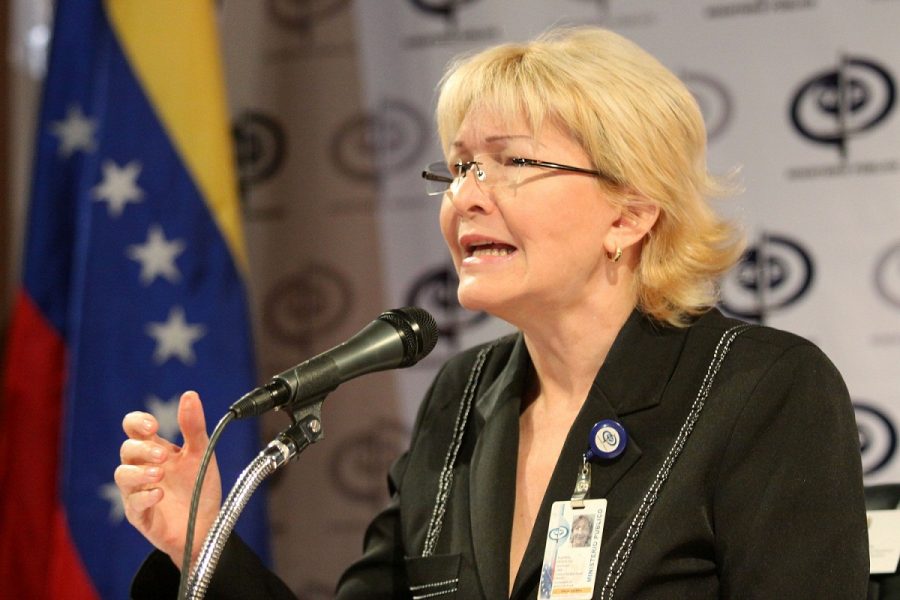New Venezuela Assembly Votes to Oust Chief Prosecutor Ortega

EghtesadOnline: Venezuela’s newly convened assembly ousted Chief Prosecutor Luisa Ortega Diaz, the highest-ranking member of President Nicolas Maduro’s administration to break ranks. Separately, the oil-rich nation was suspended from the regional trading group Mercosur.
The assembly, elected in a ballot on July 30 that the opposition boycotted, voted on Saturday to permanently remove Ortega Diaz, 59, from her post after the Supreme Court ruled on Friday evening to suspend her and send her to trial, Bloomberg reported.
Human rights ombudsman Tarek William Saab, a Maduro supporter, was named as her replacement. The assembly also voted on Saturday to stay in place for a maximum of two years. That will allow it to “take new economic and institutional measures to reorganize the state,” including a restructuring of the public prosecutor’s office over the coming weeks, Hermann Escarra, a constitutional expert and adviser to Maduro, told state TV.
“There’s a coup being carried out against the constitution led by the Supreme Court and the executive branch,” Ortega Diaz said in a statement posted on the Public Prosecutor’s office’s Twitter account. “I’ll keep fighting for the freedoms and rights of Venezuelans until my last breath.”
The government, which is becoming increasingly isolated and remains under threat of economic sanctions from the U.S., has wasted no time in using the constituent assembly to go after the last vestiges of criticism in public institutions and to weaken the opposition-led congress. The day after the July 30 ballot, Maduro jailed two prominent opposition leaders.
Sanctions Questions
A more difficult task, however, will be to fix the economy. The currency has sank in the past week to about 18,000 per dollar in the black market compared with official rates of 10 per dollar and 2,800. Beyond threatening to jail merchants who raise prices, Maduro hasn’t said what economic measures he may take to address skyrocketing inflation and a deep recession that has entered its fourth year.
Additional U.S. actions are possible, including moves to target Venezuelan oil exports. Venezuela, a founding member of OPEC, has the world’s largest proven oil reserves and is South America’s largest crude exporter. Maduro already has been personally sanctioned by the U.S., which accused him of undermining democracy.
Venezuela’s suspension from Mercosur -- for the second time in the past year -- came after foreign ministers from Brazil, Argentina, Uruguay and Paraguay held an emergency meeting in Sao Paulo. Mercosur members said the suspension would continue until democratic order is restored.
"Today’s unanimous decision for the suspension of Venezuela is a serious political sanction," Aloysio Nunes Ferreira, Brazil’s foreign minister, said on his verified Twitter account. "A country that commits such barbarities against fundamental freedoms cannot be part of our association."
Mercosur’s members will take measures aiming at reducing the negative impacts of today’s decision on Venezuelan people, the ministers said in a statement.
Earlier, National Guard officers surrounded Ortega Diaz’s Caracas offices. She posted photographs of the uniformed guards outside the building on her Twitter account and labeled it a “siege.” The Public Ministry’s Twitter account said the guards were not allowing workers to enter or leave.
Ortega Diaz has become a dissident voice, calling the government out on repression against street protesters and taking a stand against the new assembly, saying it tramples on basic rights. She told reporters on Saturday that Maduro wanted to halt her probeinto alleged bribes paid by the Brazilian construction company Odebrecht SA to government officials.
Diosdado Cabello, second in command of the ruling socialist party, told reporters that the ouster “was not an act of lynching.”
‘A Balm’
The new assembly could have the power to supplant the opposition-controlled congress, although Maduro promises it will bring “justice and peace.” In an interview on Saturday with Argentina’s Radio Rebelde, he said the assembly will soothe the tumult in Venezuela like “a balm.”
Venezuela was expected to hold regional voting to elect governors and mayors in December, while presidential elections would in theory be held in late 2018. It isn’t clear if that calendar will proceed under the constituent assembly.
Amid the turmoil, Venezuela’s dollar bonds had their worst month since early 2015 as the perceived risk of a default spiked. State oil company Petroleos de Venezuela has billions of dollars in debt maturities coming due later this year. Its notes due in November trade at 82 cents on the dollar.
H.R. McMaster, the U.S. national security adviser, said in a television interview Saturday that “democracy is over right now in Venezuela” while dismissing the threat of military intervention there from an outside source.
“The seating of this constituent assembly, it is a -- it is a watershed,” McMaster said on MSNBC. The Venezuelan people “are suffering all kinds of depredations based on the failed policies of two regimes now.”


